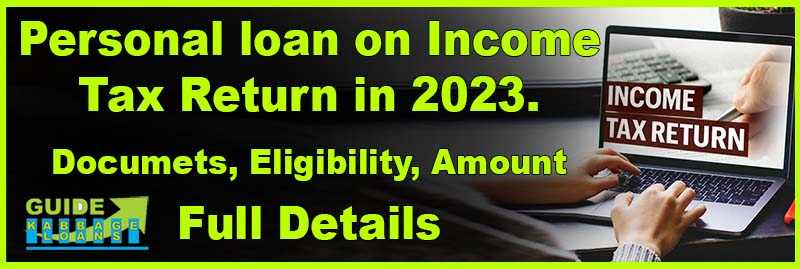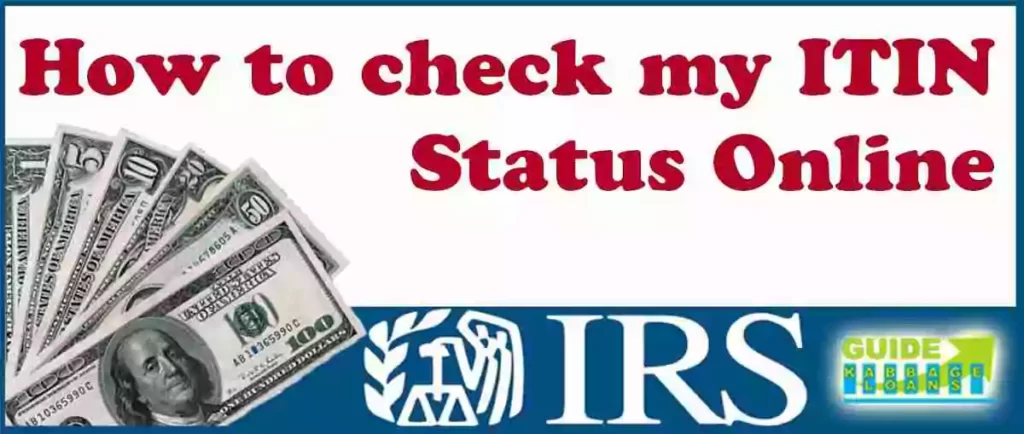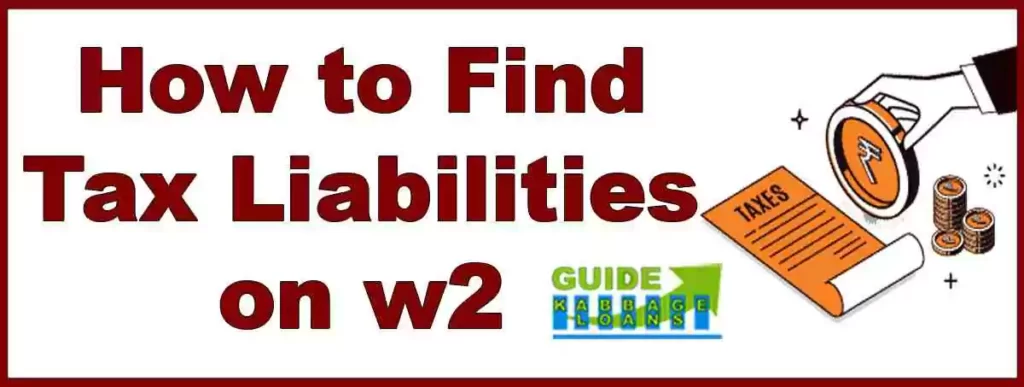When we need cash in an emergency, we often see only one option: taking out a loan. However, a low credit score can make it difficult to get a loan. In such situations, there’s another option available: getting a personal loan on income tax return. Whatever income tax return you filed in the past can now be used to secure a personal loan, and the process is quite simple.
In this article, we will guide you on how to apply for a personal loan using your income tax return, including the necessary documents, eligibility criteria, interest rates, and the best lenders in the USA for this type of loan.
Can you get a personal loan on your income tax return?
Yes, you can get a personal loan using your income tax return. Lenders look at your income tax return to see how much money you make and if you can repay the loan. This can help if you have a low credit score because it shows you have a steady income. Using your income tax return for a loan can make it easier to get approved, and you might get a lower interest rate. It’s a good option if you need money but have trouble getting a loan due to your credit score.
What are the eligibility criteria for personal loans on income tax returns?
The eligibility criteria for personal loans based on income tax returns can vary among lenders, but generally include the following:
- Filed Income Tax Return: You must have filed your federal and possibly state income tax returns for the previous year. Some lenders may require returns for the last few years as well.
- Steady Income: Your income tax return serves as proof of your income stability. Lenders typically look for consistent income to ensure you can repay the loan.
- Creditworthiness: While loans against income tax returns may be accessible to those with lower credit scores, better credit history can improve your chances of approval and may affect the interest rate offered.
- Documentation: You’ll need to provide supporting documents such as identification (e.g., driver’s license), proof of residence, and possibly additional income verification like pay stubs or bank statements.
- Debt-to-Income Ratio: Lenders assess your debt-to-income ratio to ensure you can manage additional debt repayment alongside your current financial obligations.
- Age and Residency: You must be of legal age (typically 18 years old) and a resident of the United States.
These criteria ensure that you meet the basic requirements to qualify for a personal loan based on your income tax return. Always check with specific lenders for their exact eligibility criteria and documentation requirements.
(( Reference: We obtained this information from the Credit Karma website. For more details, you can visit their website. ))
Documents needed for a personal loan on income tax return
When applying for a personal loan using your income tax return, you must provide several documents to verify your financial status and identity. These documents can vary slightly depending on the lender, but commonly required documents include:
- Filed Income Tax Return: Copies of your most recent federal and state income tax returns.
- Proof of identity: Government-issued ID, such as a driver’s license, passport, or state ID card.
- Proof of income. Pay stubs, bank statements, or other documentation showing your income sources. (If not, ITR will be used instead)
- Credit Report: Some lenders may require a credit report to assess your credit history and score.
- Bank statements: Some lenders require the last 6 months or more Transaction details
- Employment Verification: Use an employment letter or recent pay stubs to confirm your current employment status.
- Proof of Residence: Utility bills, lease agreements, or any official document that shows your current address.
- Debt Information: Details of any existing debts, such as loan statements or credit card bills, to determine your debt-to-income ratio.
How can we get a personal loan using income tax return?
To get a personal loan using income tax return, follow these steps:
Gather Necessary Documents
Ensure you have all required documents, including:
- Your most recent federal and state income tax returns.
- Government-issued ID (e.g., driver’s license, passport).
- Proof of income (pay stubs, bank statements).
- Proof of employment (employment letter or recent pay stubs).
- Proof of residence (utility bills, lease agreements).
- Credit report (if required by the lender).
Research Lenders
Look for lenders that offer personal loans based on income tax returns. Check their eligibility criteria, interest rates, fees, and repayment terms. Some banks, credit unions, and online lenders offer this type of loan.
Top Lenders for Personal Loans on Income Tax Returns
Different lenders are available in different states across the United States of America who provide personal loan on income tax returns. That’s why you can do a local search for a famous lender in your state.
Below we have listed some lenders who provide personal loans against income tax returns. You can get more information about them by visiting their website.
Apply for the Loan
After selecting a good calendar, please find out about the application process from them. After that, apply for the loan. If there is an online process for this, then apply through the online process and apply for the loan by attaching all the necessary documents.
Wait for Approval
After you submit your loan application, you need to wait for the lender to approve it. The approval process can take anywhere from 2 days to 2 weeks, depending on the loan amount and the lender’s verification procedures. Some lenders approve loans within 2 days, while others may take longer due to extensive verification requirements.
Therefore, after applying for a loan, it’s important to inquire with your lender about their specific approval timeline and be prepared to wait accordingly.
How long does it take to get a personal loan using an income tax return?
The Income tax return for personal loan approval does not take much time. We have already told you above that this is a short-term loan just like a payday loan. This gets approved in 24 hours and the amount is transferred to your account. If there is any problem with your documents, then it also takes two weeks.
If all your documents are correct then it gets approved in 24 hours. We need to take a personal loan on income tax return only when we need cash in an emergency. That is why it is called a short-term or instant loan.
Additional Tips
- Compare Offers: Don’t settle for the first offer. Compare multiple lenders to get the best terms and interest rates.
- Check Fees: Be aware of any processing fees, prepayment penalties, or other hidden charges.
- Improve Credit Score: If possible, improve your credit score before applying to increase your approval chances and secure better loan terms.
How is an income tax return used to obtain a personal loan?
An income tax return can indeed be a valuable document when applying for a personal loan. While personal loans themselves may not offer tax deductions or benefits, your ITR can serve as a crucial piece of documentation to demonstrate your income to potential lenders.
Many lenders do accept ITR as a valid proof of income when assessing your eligibility for a personal loan. Your ITR provides a comprehensive overview of your annual income, sources of income, and tax liabilities. Lenders consider this information to evaluate your financial stability and repayment capacity, making it an essential tool in their decision-making process.
Are personal loans on income tax returns subject to credit checks?
Yes, personal loans on income tax returns are typically subject to credit checks. The lender will review your credit history, income, and other financial information to determine your eligibility for the loan. Having a good credit score can increase your chances of getting approved for a personal loan on your income tax return.
When you file your income tax returns, personal loans themselves are not directly subject to credit checks. The process of filing taxes does not involve a credit check on your loans. Instead, it focuses on reporting your income, deductions, and credits to determine your tax liability.
What happens if I cannot repay a personal loan on an income tax return?
If you do not repay the personal loan taken on your income tax return, then the same thing will happen to you, which happens to those who do not pay other types of loans. First of all, your credit history is bad and you will have a lot of trouble getting a loan in the coming time. Apart from this, along with your interest, the late payment fee also increases day by day and this small amount of loan becomes a big amount in the coming time, which you have trouble repaying.
Apart from this, it depends on your lender and the terms and conditions of your lender. Because some lenders can also take legal action or may be reported to credit bureaus. That’s why you should repay the personal loan taken on your income tax return on time.
Conclusion.
Securing a personal loan using your income tax return can be a viable option, especially if you have a low credit score. By demonstrating a steady income through your tax returns, you increase your chances of loan approval and potentially lower interest rates. However, it is crucial to gather all necessary documents, research lenders carefully, and compare their terms before applying.
Remember to repay your loan on time to avoid damaging your credit history and incurring additional fees. By following these steps and tips, you can navigate the process smoothly and make informed financial decisions.
Faq’s
What is the best personal loan against income tax return?
The best personal loan against income tax return is not any particular loan. But you can take a personal loan against income tax return by choosing the right lender. We have given complete information about this in our article.
What credit score required for personal loan against income tax return?
Minimum 640 or above credit score required for personal loan against income tax return.
How much personal loan can we get against income tax return?
The amount of personal loan you can get on your income tax return is not fixed. But the personal loan available on income tax return is a short term loan. It is available in between $100 to $5000. Apart from this, it depends on your credit history and your lender. that how much amount he approves.
What are the interest rates for personal loans on income tax returns?
The interest rates for personal loans on income tax returns are not fixed. In most of the states of the United States of America, personal loan against income tax return is interest free. But there are some lenders who charge interest on it. Their interest rate can be between 2 percent to 8 percent. You will get the correct information about this from your lender.
Can I use my income tax return as proof of income for a personal loan?
Yes you can use your income tax return as proof of income for a personal loan or any other loan.
Can I get a personal loan on my income tax return if I have bad credit?
Yes it may be possible to get a personal loan on your income tax return if you have bad credit.
Because even if you have a bad credit score, whether you will get a personal loan on income tax return or not, it completely depends on the lender. If your lender wants, he can approve it and if he does not want, he can also reject it.
Thanks for your visit.
(Personal loan on income tax return)
Disclaimer: The information provided in this article is for educational and informational purposes only. We do not endorse any specific lenders or financial products. Always conduct your own research and consult with a financial advisor like us, before making any financial decisions. Loan terms and conditions may vary, and it is important to read and understand all loan documents before signing. Your use of this information is at your own risk.





